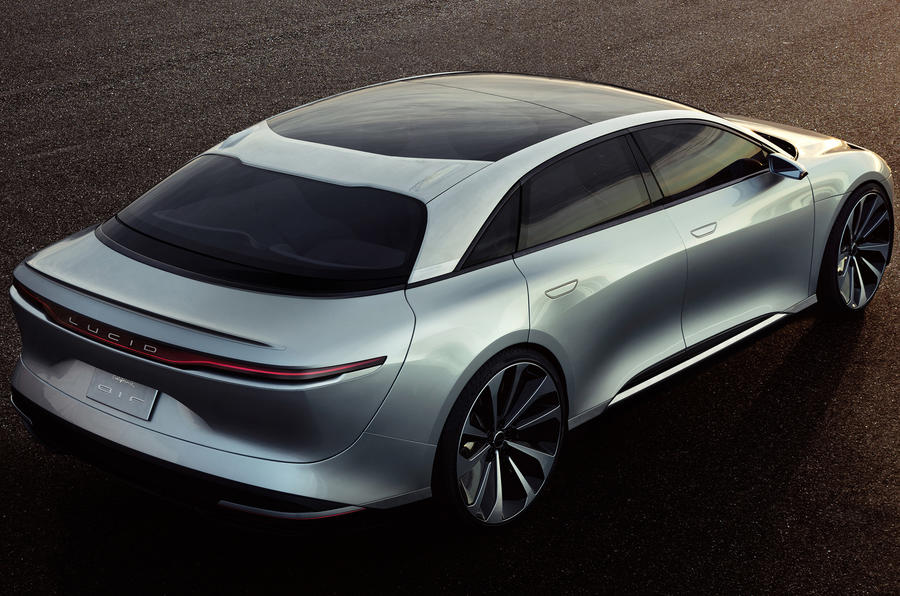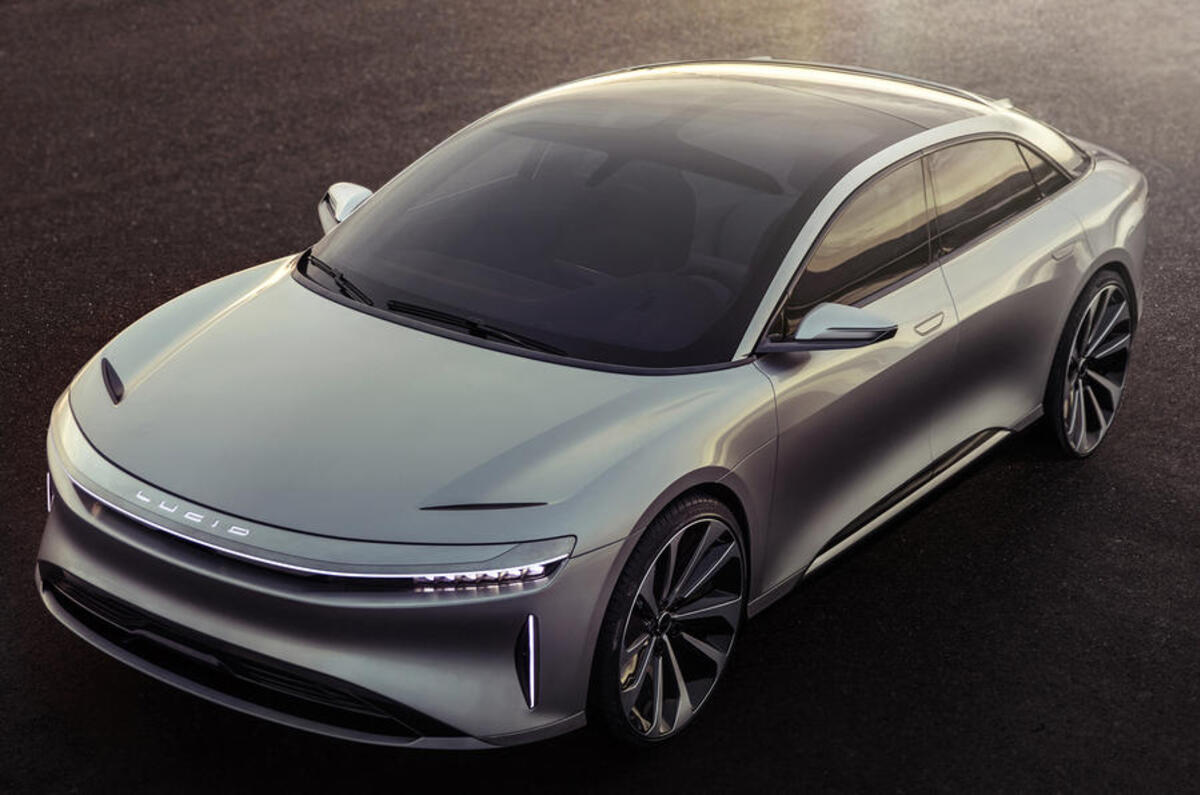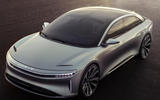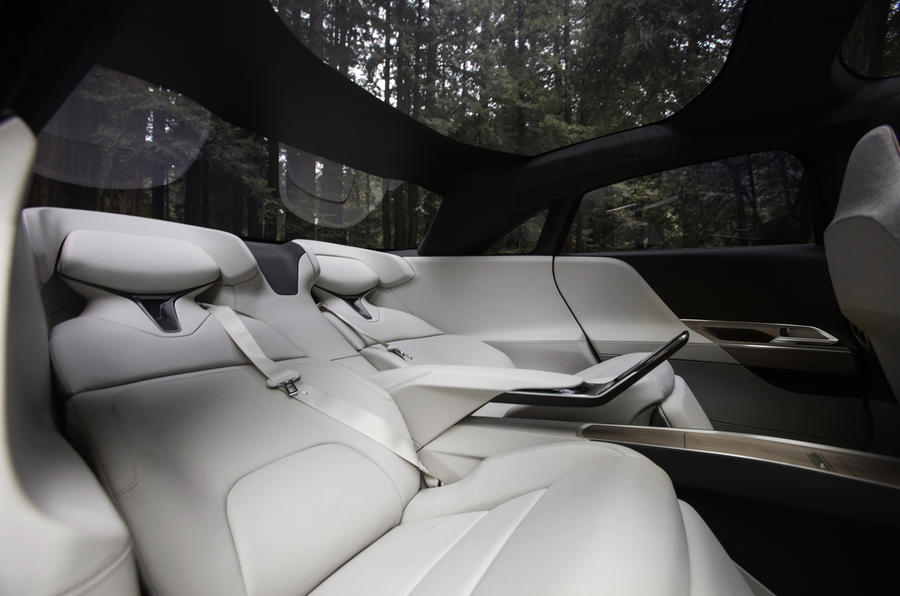The Lucid Air, an all-electric saloon due in 2019, will mix sports car handling with the comfort of a luxury saloon, its marketing manager has claimed.
David Salguero told Autocar that development of the Air, a car that is claimed to have a 400-mile range, is being led by former Lotus, Jaguar and Tesla engineering boss Peter Rawlinson, who is Lucid’s chief technical officer.
Salguero said Rawlinson’s experience will ensure the California-based company’s first model delivers as a driver’s car that is able to take on offerings from established marques such as BMW, Audi and Mercedes-Benz.
Using a twin-motor four-wheel-drive powertrain with up to 1000bhp in its most potent form, the Air will be considerably more powerful than its conventional rivals. Its creators believe the low-set placement of its batteries will also help the car steer at least as effectively as those rivals.
“The Air has been designed with enough flexibility to be future-proof,” Salguero told Autocar during an exclusive interview. “It’s the kind of car that lovers of driving will like to drive. Rawlinson is the best man for the job – he knows how to make a beautiful-handling car.”

Lucid isn’t aiming the Air directly at the Tesla Model S but rather a wider window of luxury performance saloons, including models such as the BMW 750Li. Salguero said this long-wheelbase BMW – which is 150mm longer than a regular 7 Series – was actually the Air’s benchmark for cabin space but that the car’s overall dimensions would be smaller.
“By miniaturising the EV powertrain, we can make [the Air] small on the outside but big on the inside,” he said. “It will have a large, comfortable, spacious interior, comparable [in size] to the S-Class long-wheelbase, while being about the same size as an E-Class.”















Join the debate
Add your comment
There is too much bullshit in the air
Irrespective of how it is powered, you cannot just build a car that is as good as an S Class Mercedes. You just can't. It takes decades of experience and billions of £s.
Even Mercedes can't make the S Class 'handle like a sports car'.
Totally bloody ridiculous, but so many people seem to think if they close their eyes and believe, it will be true.
Speed is irrelevant......?!
Why do we need Cars like this to do 200mph+ ?, surely the object of Electrifying Cars is provide clean safe transport?,plus, in the not to distant future, Cars will be the new White Goods,taken for granted,anonymous lumps of plastic and Aluminium,no , silly top speeds will not matter in the real World where 99% of us live.
Peter Cavellini wrote:
It's a stat you can use to sell the car, and is the result of having big power - same as an ICE car. If you've got power for acceleration, then you can also pull off a high top speed.
A combustion engine has to be tailored either for power or economy - the electric motor is a very simple device and doesn't have to make anywhere near the same degree of sacrifices.
Think about it - in almost
Think about it - in almost all cases new tech is previewed on high end, lower volume, expensive products and then filters down to lower end cheaper products, this applies to almost ALL products, electric cars are no different. Your question is silly, you may as well ask why the cheapest Fiesta doesnt come with massaging seats.
I believe increase in
I believe increase in performance = improvement in range as long as the driver does not take advantage of the performance potential. This is the paradox.
It's disingenous of manufacturers to boast about performance without emphasizing range, in this case 400 miles, so it claimed, depending of course how it's driven.
.
So they do a 1000hp twin motor with a 400mile range and a single motor 250hp with 240 mile range. Why not fit the big battery to the lower powered single motor car. Imagine if BMW fitted a tiny fuel tank to a 320d just to ensure it has less range than an M3.
Leslie Brook wrote:
You're coming at this from an ICE perspective. in electric cars the battery is the really expensive bit, not the motor. So if you're doing one cheap short-range model and one more expensive long-range model, you might as well chuck in some bigger motors on the long-range one and have straight line performance as a selling point too.